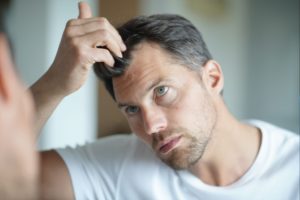How Hormones Affect Sleep
It’s hard to overstate the importance of sleep on your physical and sexual health. Men produce the highest levels of testosterone in their final hours of sleep and the first hour of waking. Low testosterone can interfere with your ability to sleep. Sometimes, it can lead to sleep apnea, a dangerous sleep disorder.
Many men who suffer from low testosterone or low T levels also have sleep disorders like sleep apnea. In fact, men are twice as likely as women to have sleep disorders.
For a free consultation, call (305) 682-1818
What Is Sleep Apnea?
There are currently about 3 million people currently seeing a doctor for treatment of sleep apnea.
If you have sleep apnea, you periodically stop breathing while you’re asleep. Sleep apnea prevents your mind and body from reaching the deep, restorative rest you need to function at your peak of health and vitality.
What Is Sleep Apnea Like?
When you have sleep apnea, you wake up suddenly with the feeling that you’re gasping or choking. Usually, you can get back to normal after you take several deep breaths. In a more severe case, you’ll repeat that pattern 10 to 30 or more times an hour throughout the night.
These interruptions interfere with your ability to breathe. They prevent you from getting the deep sleep that’s crucial to your health.
The most common form of this disorder is obstructive sleep apnea. This means your throat muscles relax several times during the night. When they relax, they block your airways.
Click to contact our specialist today
What Causes Sleep Apnea?
Following are the main things that cause or contribute to sleep apnea.
Overweight
Obesity is a common cause of sleep apnea. One study found that 40% of men with sleep apnea were overweight. Other studies have found that simply losing weight can help reverse sleep apnea. If you’re overweight and you’ve been told you snore, you may have a sleep disorder.
Age
This is the major cause of the disorder. Sleep apnea is much more likely to occur in men over 65 and women who have gone through menopause. If you have a history of snoring or sleep apnea runs in your family, you’re more likely to develop the disorder.
Lifestyle Factors
The same habits that affect your overall health can have a negative effect on your ability to sleep. Drinking heavily, eating a poor diet and smoking can all contribute to sleep apnea.
Complete a Free Consultation form now
Low Testosterone Levels
There is a definite link between your T levels and the amount of high-quality sleep you get. Most men can produce testosterone if they get regular, deep sleep.
When your testosterone drops, however, it causes sleep problems like insomnia. Low T levels can also increase the chances you’ll gain weight, and that can lead to worse sleeping problems. It’s a vicious cycle that seems impossible to stop. You can stop it, however, with medically-supervised hormone replacement therapy (HRT) using safe, bioidentical hormones, which are used exclusively at HealthGAINS.
In a 2014 study published in the Asian Journal of Andrology, researchers concluded that “Testosterone deficiency may have a deleterious effect on sleep quality that may improve with testosterone replacement.” (1)
Sleep Apnea Symptoms
Do you feel sleepy at odd times during the day? Many people with sleep apnea don’t get a full night’s sleep. This can leave them drowsy in the daytime. (2)
This drowsiness may be caused by the poor quality of sleep that often accompanies low testosterone levels.
You may have sleep apnea if you also experience the following symptoms:
- Being told you snore loudly.
- Waking with a severe headache.
- Waking up gasping for air.
- Difficulty concentrating.
- Sweating while you sleep.
- Inability to get your blood pressure under control despite lifestyle changes and medication.
If you suspect you have sleep apnea, talk to your doctor. Diagnosing the condition will require a sleep test, and you may have to spend a night in the hospital. Your doctor can prescribe the right treatment. Typically, people with sleep apnea use a breathing machine called a CPAP (continuous positive airway pressure) device.
Dangers of Poor Sleep Quality
Lack of sleep can affect every part of your mental, physical and sexual health. Your body needs regular, restorative sleep to function at its peak.
Without sleep, you can experience:
- Extreme anxiety and panic attacks.
- Depression.
- Daytime drowsiness while you’re working or driving.
- Irritability and impatience.
- Inability to focus or concentrate.
- Low sex drive.
- Uncontrollable hunger.
- Erectile dysfunction.
Benefits of Hormone Therapy for Sleep Apnea
Here’s the bottom line. Your body can only produce the hormones it needs if you’re getting regular sleep. You can only get that sleep if you have the correct hormone levels.
How do you restore the balance? Hormone replacement therapy is the only safe, effective, and clinically proven way to restore healthy testosterone levels. Call us today at 305-681-1818 to speak with one of our knowledgeable wellness advisors who can help answer any lingering questions you may have and help you get set up with your first appointment. Call today.
References
- The Relationship Between Sleep Disorders and Testosterone in Men, https://www.ncbi.nlm.nih.gov/pmc/articles/PMC3955336/
- Sleep Apnea: Symptoms and Causes, https://www.mayoclinic.org/diseases-conditions/sleep-apnea/symptoms-causes/syc-20377631
Call or text (305) 682-1818 or complete a Free Consultation Form







